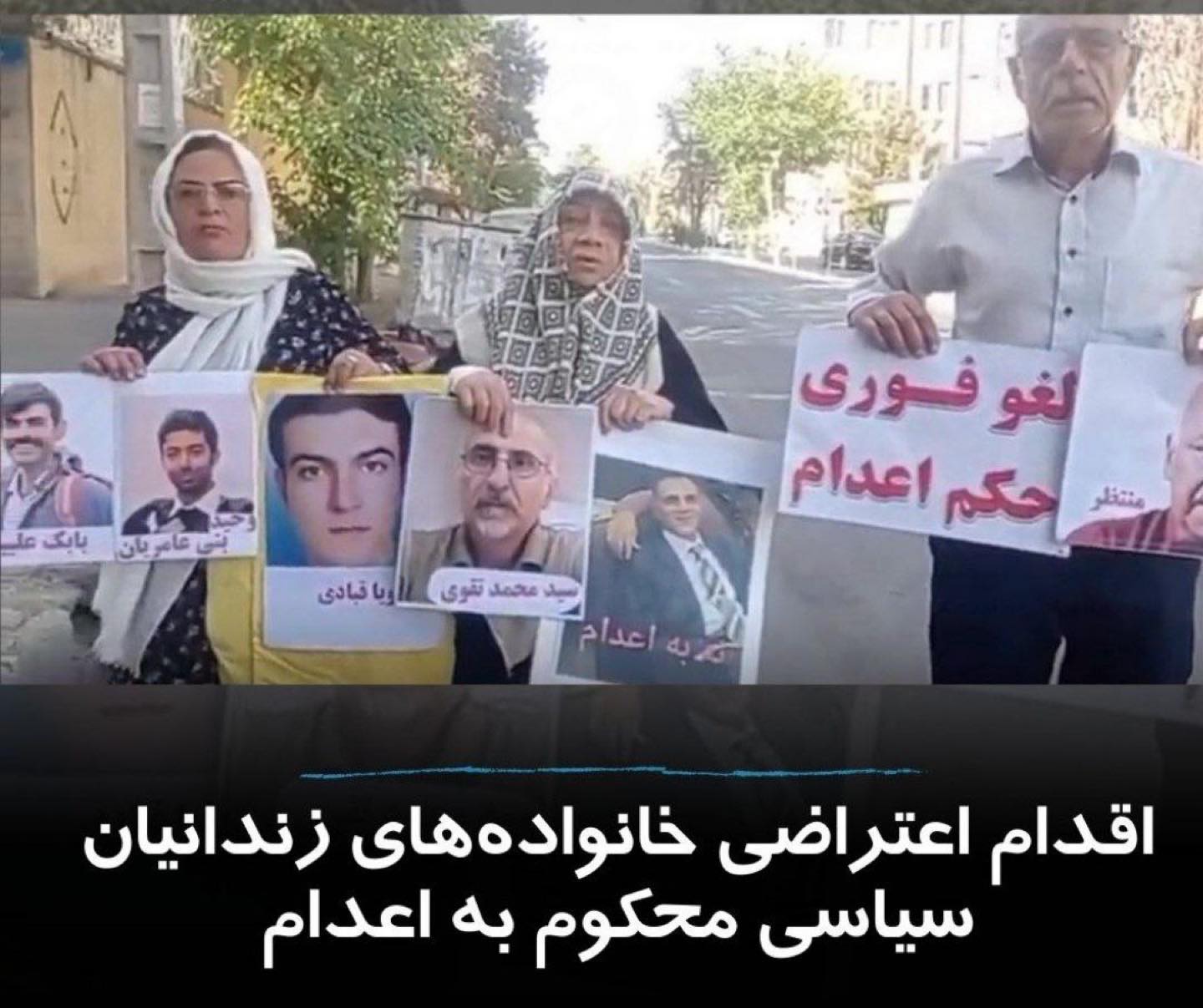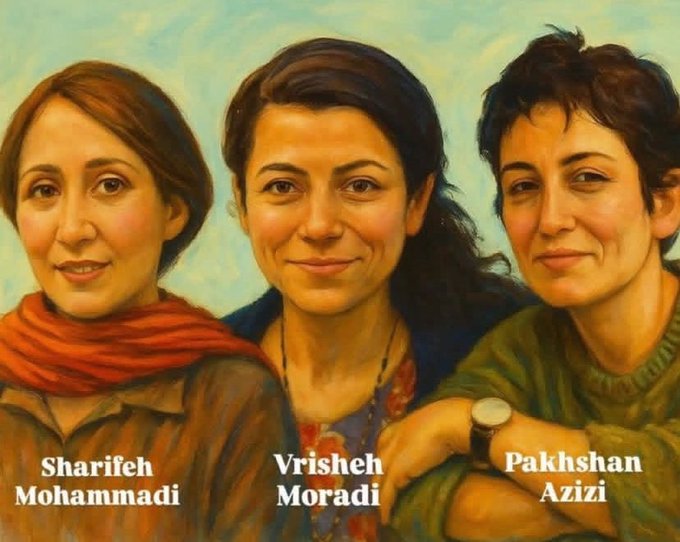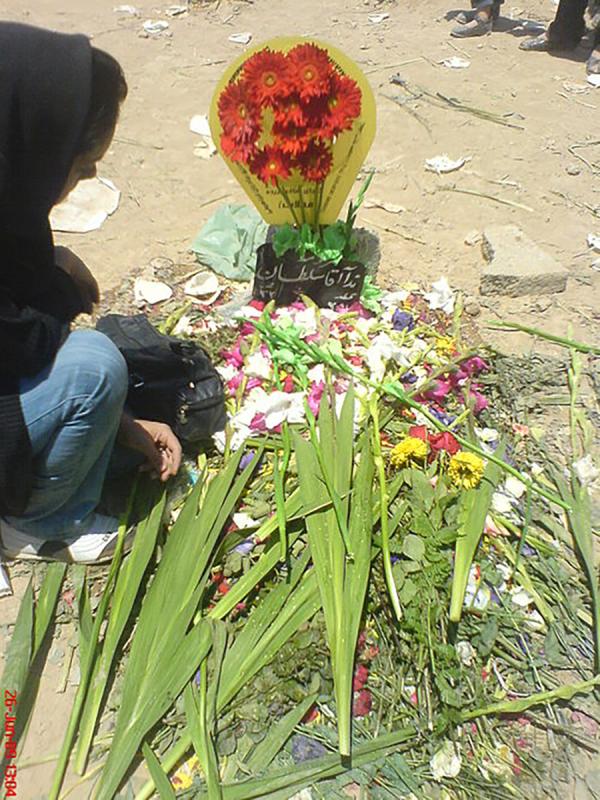A throughline of these pivotal events in Iran—from the brutal Shah to the brutal Mullah regimes—is the fight to free political prisoners. It is worth noting the statement’s firm stand on NO executions for anyone, and DUE PROCESS for all—in pointing to the struggle that will bring a better future. By presenting the arc of the three “anniversaries," this statement serves as a reminder (to all too many) Iranians and others, who cheered the June U.S.-Israeli aggressions/bombings of Iran in hopes of regime change of the IRI. It objectively reminds them to bring forward another way rather than repeat the struggle/sacrifices but simply exchange oppressors. Implicit in the demands of their statement is the search for a future that embodies a full humanity for all.
The statement by the Mothers of Laleh Park also serves as a reminder to people in the U.S. of our special responsibility to stand with the people of Iran as stated in the IEC’s Emergency Appeal. The English translation and minor edits of the statement and bracketed words/phrases are by IEC volunteers, for clarification.
To highlight the urgency of their statement, today there are at least 66 political prisoners on death row in Iran’s hellish prisons, 20 of whom are protesters! Two are from the rebellion of 2019 and 18 are from the Woman, Life, Freedom uprising (half of whom are oppressed ethnic minorities of Kurds and Baluch). So far in 2025, Iran has executed over 800 prisoners, with three women activists (named in the statement) facing imminent execution. Build support for the Mourning Mothers, for the IEC and for progressive (left-leaning) commemoration events of the WLF uprising wherever you can online or on site. Take photos and/or write to the IEC about these events before or after they take place. Adelante!
Excerpts of Statement by Mothers of Laleh Park, Iran
Let’s Rise Up United to Abolish Iran’s Death Penalty: The Organized Murder Depriving Peoples’ Right to Life!
For more than 46 years, the fascist-reactionary-Islamic rule of Iran has systematically expropriated the Iranian people's revolution of 1979 against the [Shah’s] monarchical dictatorship, suppressing, arresting, torturing and killing opponents and activists in the most brutal way possible.
The killing of activists under the rule of the Islamic Republic of Iran [IRI] began in 1979 in Kurdistan, Turkmen Sahara and Khuzestan, and then, in the name of the “Cultural Revolution,” in the 1980s, the elimination of political opponents and activists was carried out on a large scale in the form of deportations, arrests, torture, and continual killings, reaching their peak in the summer of 1988. After the end of the Iran-Iraq war and the government's intention to transition to a period of construction and involve Iran’s Revolutionary Guard Corps and other repressive forces in economic projects to gain more profit, they needed to remove resistant and conscious political prisoners from the scene and create a fascist atmosphere in society so that no voice of protest could be raised.
As a result, on the orders of the then leader Ayatollah Khomeini and his associates, nearly five thousand political prisoners… who were not willing to give up their humanist beliefs were hanged behind closed doors in the summer of 1988, secretly and without informing the political prisoners or their families. After nearly four decades, the families and the civil society still do not know why and how these fighters were killed and where their bodies are…

At this same time, we are also on the eve of the third anniversary of the government murder of Gina (Mahsa) Amini and the beginning of the revolutionary uprising of "Woman, Life, Freedom," a movement that shook the pillars of this corrupt regime and brought about very valuable achievements. These struggles continue in various forms. Women fighters and progressives have risen up against the male-patriarchal structure, against control over their bodies, against compulsory hijab, and against any discrimination in a revolutionary way and are not willing to go back. Independent and popular movements of workers, teachers, nurses, retirees, and other hard workers, freedom seekers, and justice seekers are also ongoing every day throughout Iran and even inside prisons, and they are not willing to remain silent. [Emphasis by IEC]
This is occurring in a situation where the government is facing deep political, economic, and social crises and is losing its ability to govern society. It is extremely afraid of the flaring up of these protests that are taking place at all levels of society, lest they rise up united against this system of discrimination.
For this reason, the regime utilizes the only way it can possibly control these movements, namely through the most severe repression possible, arresting and torturing activists one after another, and issuing death sentences in order to prevent social movements and the creation of organizations and gatherings, and perhaps to create a reprieve for itself and to be able to last a little longer.
From time to time, it also selects and executes a number of political prisoners so that, on the one hand, it can increase the fear and terror among the people who hate this government, so that they will accept the status quo, and on the other hand, it can test the activists to see how much they are willing to remain silent in the face of these crimes. However, out of fear of the rise of the movements, it constantly releases a number of political prisoners on heavy bails so that it can perhaps create a balance between the anger and happiness of the people in society.

Recently, the death sentence of Sharifeh Mohammadi, a woman activist in the labor movement, was confirmed by the country's unjust Supreme Court, because they are extremely afraid of the solidarity of the workers' movement with the women's movement, and they think they can continue to silence society by creating fear and terror, as in the 1980s.
But in these catastrophic economic, political and social conditions, where the majority of people are struggling to make ends meet, despite the repression, they cannot stop the widespread strikes in Iran. Undoubtedly, each of these cruel sentences and executions can become a spark, especially the execution of women fighters in a situation where the women's movement is the vanguard of the movements, which can bring the protests to their peak again, just as the government murder of Gina Amini caused a widespread and revolutionary uprising throughout Iran due to discrimination against women and discrimination against nationalities.
Because women suffer multiple oppressions and as a result, they can bring different spectrums with them and launch a huge movement… the execution of activists such as Sharifeh Mohammadi could also have such consequences for the government. We are currently witnessing teachers and retirees openly protesting the death sentences of Sharifeh Mohammadi, Varisheh Moradi, and Pakhshan Azizi, and for all the political prisoners. On July 26, [two political prisoners] Mehdi Hassani and Behrouz Ehsani were executed without the knowledge of their families and society, and behind closed doors.
The officials involved in the crimes of the [IRI] certainly know better than us that these crimes will not go unanswered and that they will eventually have to be held accountable, just like Parviz Sabeti could not be acquitted of participating in the crimes and torture of political activists during the Shah's reign.
But now, according to the Akhbar Rooz website (08/13/2025): "The U.S. federal court in Florida issued two historic rulings in the lawsuit filed by three former political prisoners against Parviz Sabeti, a former senior official of SAVAK [Shah’s secret police], which they considered an important victory for torture survivors and a decisive step on the path to justice. These rulings, while recognizing numerous documents and evidence about Sabeti's direct and conscious role in directing and facilitating organized torture by SAVAK, rejected his request to dismiss the case on the pretext of the passage of time and declared threats and reprisals against the plaintiffs and their lawyers as influential factors in the decision-making."
Yes, the crime is not subject to the statute of limitations, and we hope that one day… not too long from now, the criminal officials of the [IRI] will also be tried and punished in fair and public courts in Iran.

We, the Mothers of Laleh Park, as a voice of the Iranian people's movement for justice, strongly condemn any repression, arrest, torture, and the issuance of unjust sentences of imprisonment, flogging, amputation of fingers, and the issuance and execution of all death sentences, whether for political or non-political prisoners, and we stand together with independent and popular movements in Iran until the end and demand the immediate cancellation of all death sentences, including the death sentences for Sharifeh Mohammadi, Varisheh Moradi, and Pakhshan Azizi, and nearly sixty other political prisoners….
We offer our heartfelt condolences to the grieving families of Mehdi Hassani and Behrouz Ehsani. We are deeply concerned about the health and lives of the prisoners about to be executed and their families….
Although we know that the pain of losing our loved ones is very difficult and unbearable for all of us, it is necessary to turn this common pain into a common struggle for justice, to stand more determined and united than before against this oppressive, reactionary, corrupt and criminal regime, to not allow these crimes to be repeated again and again. Let us be vigilant, today Sharifeh Mohammadi’s life is in danger and tomorrow it will be someone else’s turn. The lives of every precious and fighting young person in Iran are in danger. It is up to us to rise up united to abolish the death penalty in Iran, this organized state murder that deprives people of their right to life. Let us insist that the death penalty [be] never and for no one.
We ask you, the plaintiffs, to join us in achieving the following demands:
1) unconditional release of all political and ideological prisoners
2) abolition of the death penalty and flogging and an end to all torture and killings including: execution, assassination, street killing, retribution, and stoning
3) trial and punishment of the perpetrators of all crimes committed by the officials of the [IRI] from the beginning to the present day in open, fair and popular courts (punishments other than death)
4) unconditional freedom of speech, thought, and writing
5) unconditional freedom of dress and the right to control one's body
6) the right to protest, strike, assemble, organize and form independent parties
7) equal citizenship-rights and the elimination of any discrimination
8) separation of religion from the government.
We deeply believe that the utterly corrupt, totalitarian, religious-reactionary and undemocratic structure of the Islamic government of Iran must be broken and a new plan must be put in place. Freedom, equality, democracy and social justice must be achieved so that we can prevent the repetition of crimes, discrimination and injustice.
Mothers of Laleh Park, Iran
August 18, 2025



